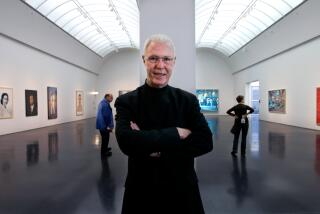Arts Congress Stresses Need to Cooperate
- Share via
The need for arts groups to work together in seeking support for the arts emerged quickly as a major topic at the 13th annual Congress of the Arts held this week in Costa Mesa.
Sponsored by the California Confederation of the Arts, a state advocacy group, the two-day arts congress offered workshops and caucuses to sharpen the 380 participants’ skills in leadership and in making connections with local and statewide political, education and business leaders.
“We discussed arts really as a cooperative venture,” said Bonnie McClain, development director of the Pacific Chorale, “not just one organization getting money ahead of the other, but trying to get more for everybody and get people to donate more per capita.”
“California is low” in state support for the arts, Pacific Chorale manager Rita Major said. “It’s always among the low 10 in the country.”
Margie Shackelford, director of development for the Newport Harbor Art Museum, also stressed the notion of unity:
“It’s important to point out that the better that one arts organization does, the better they all do,” she said. “Some people would look at Newport Harbor Art Museum and South Coast Repertory as somewhat competing for the same funds. But I believe we’re all together in the sense that we want every arts organization across the state to do well. That’s what we’re all working for.”
Kathleen Costello, associate director of development at the Newport Harbor Art Museum, said the goal really is “a balance between the private and the public sectors.”
“The private sector truly believes there is a reason to support programs in the arts and make them flourish,” Costello said. “But they also look for the endorsement of public agencies. They want to know that they are not being asked to carry the whole burden. . . . There needs to be a balance between the private and public sectors. Through the congress, smaller organizations learn how to achieve the balance, and larger organizations learn how to maintain it.”
Martin Weil, managing director of Opera Pacific and co-chair of the arts congress, said local business leaders and community leaders are “perfectly aware of what it means to support your field.”
“They support their businesses, and they understand what it means to support our business. Our business is the arts.”
Weil described the congress as “the one time each year that arts groups, not only from around the state but from all different disciplines, attend. It’s the one time to get together and talk about mutual concerns. . . .”
Bonnie Hall, director of development for South Coast Repertory, said discussions at the congress are carried out “more on a policy level than on a (specific) programmatic level.”
“Then we take (the policy discussions) back to our boards of directors and our artistic directors and managers and discuss the issues, and they become aware of how the rest of the field is feeling about an issue,” Hall said.
Two major issues discussed at the congress were “multicultural and arts education awareness,” Hall said.
Particularly aware of these two issues is Sister Beth Burns, artistic director of St. Joseph Ballet, a company she founded in 1983 to teach dance to minority and disadvantaged children.
“I’m really interested in networking with all kinds of people across the state who share particularly my interest in promoting the arts for people who usually have no access to the arts,” Burns said. “I haven’t known of anything in Orange County in a long time that brought so many people together who want to advocate arts for all parts of our community.”
More to Read
The biggest entertainment stories
Get our big stories about Hollywood, film, television, music, arts, culture and more right in your inbox as soon as they publish.
You may occasionally receive promotional content from the Los Angeles Times.










